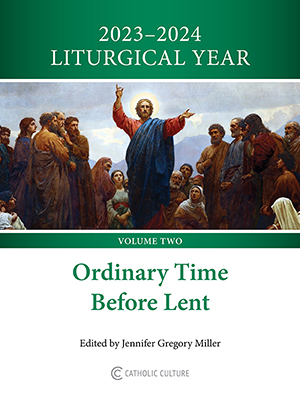The best argument against the 'celibate gay Catholics'
By Phil Lawler ( bio - articles - email ) | Jan 26, 2015
In the space of a generation, the connotation of the word “gay” has changed radically. To my father, “gay” meant carefree and happy. To my sons, “gay” means homosexual.
Any living language is constantly changing, as popular usage gives words new shades of meaning. The process of change can be confusing, as some people abide by the old meaning while others adopt the new. In the case of the word “gay” that confusion is particularly acute, because some people assume that a man should be troubled by any physical attraction to other men, while others argue that he should be untroubled—gay—about those feelings.
For Catholics the confusion is aggravated still further because some people argue that if a man is attracted to other men (and the same applied to a woman attracted to other woman), he should accept his orientation as an indelible aspect of his personality--of how God made him—and thereforce accept it, even rejoice in it, despite the struggles it entails.
In recent years, as public acceptance of homosexuality has increased, proponents of this view have also gained broader support among faithful Catholics. The advocates of “gay celibacy” argue that one can proudly affirm his “gay” identity, while still upholding the Church’s teachings on sexuality, by committing himself to celibacy.
In a very important little essay for Crisis, Daniel Mattson rejects that line of thought. Mattson acknowledges that he is attracted to other men. In fact he is one of the stars in a a powerful film produced by Courage, the apostolate dedicated to helping faithful Catholics cope with same-sex attractions. Yet Mattson refuses to define himself in terms of that sexual orientation.
”I am not, in fact, a gay man,” Mattson writes. “Nor is any man.”
Mattson accepts Church teaching not simply as a set of moral standards, a list of what one should and should not do, but as an explanation of God’s plan for the human race. In that plan, he observes, God made man for woman, and woman for man. A man who strives for virtue will do his utmost to conform to God’s plan. If he feels tugged in a different direction, that is not surprising. We are all poor, fragile sinners; we all have our weaknesses. But Mattson believes that if he accepts his identity as a beloved child of God, he should look beyond his problems and see himself as his Father sees him: the complete man, not the broken one.
Accepting myself as I truly am requires that I reject a belief that I have a sexual identity other than being a man made for women. Recognizing this truth of who I am, as a sexual creature, is fundamental to the virtue of chastity.
Notice the use of the term “chastity” rather than “celibacy.” To be celibate is to renounce sexual activity: a commitment that can be made for any number of reasons, good or bad. To be chaste is to grow in virtue.
Mattson’s essay is important because he critiques the “gay celibates” from a new direction. Others have argued that the “gay celibates” go too far toward acceptance of the homosexual agenda. That’s an important argument, to be sure. But Mattson offers a more compelling one: that they don’t go far enough toward acceptance of God’s will.
All comments are moderated. To lighten our editing burden, only current donors are allowed to Sound Off. If you are a current donor, log in to see the comment form; otherwise please support our work, and Sound Off!
-
Posted by: 1Jn416 -
Jan. 28, 2015 8:51 AM ET USA
I have watched this debate between the writers at Crisis and the writers at spiritualfriendship.org with some interest, and have often thought they are talking past each other because they are using the same words to mean different things. A protestant seminarian published a very interesting article that touches on this at http://spiritualfriendship.org/2015/01/27/and-again-more-thoughts-on-lgbt-terminology/ or http://bit.ly/1uACVkz. It is worth reading.
-
Posted by: timothy.op -
Jan. 27, 2015 10:23 AM ET USA
The Dominican penchant for distinctions is very helpful here. Ontologically, at the deepest level of our being, every human being is heterosexual. In the fallen state resulting from original sin, some people experience same-sex attraction. Although it is healthy to acknowledge honestly the condition in which one finds him/herself, it is decidedly unhelpful to pay more attention to one’s condition than to one’s fundamental nature.
-
Posted by: koinonia -
Jan. 26, 2015 10:54 PM ET USA
These words are not likely to win many friends in the mainstream nor are they to gain much traction even among certain prelates of the Church. Some might even play the h card for "hate speech." But reality is unforgiving when it comes to truth. We might pray that Phil's words are not subject to condemnation (publicly or in private) among our pastors. Regardless, promoting "growth in virtue" is nothing if not charity for our neighbor, and scripture says "charity covereth a multitude of sins."









